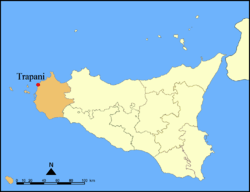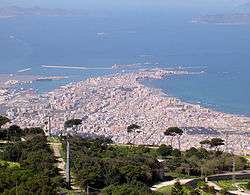Trapani
Trapani is a port city and the capital of Trapani province in the north-west corner of Sicily, Italy. Trapani has a lively atmosphere due to its position as the capital and its economic activities as a port. It has a rich history and many historical buildings have been preserved. Old traditions are cherished. Thanks to the presence of an international airport, the city with its marina and beaches is increasingly popular as a tourist destination. The number of cruise ships calling at the city increases every year. For the individual traveler Trapani is a great base for day trips or for traveling further afield in Sicily.


Understand
The population of the urban area is about 90,000, including the north-eastern suburb of Casa Santa, which is not part of the comune (municipality) of Trapani.
History
The history of Trapani (Greek: Drépanon, Roman: Drepanum) is as old as Greek mythology. As early as the 13th century BC, the Elymians, who had settled in Erice and Segesta, used Trapani as a natural harbor. The Phoenicians expanded the city in the 9th century BC. In 260 BC, the Carthaginians used the port as a base. Two major battles took place here. In 249 BC the Romans were defeated by the Carthaginians. Eight years later it was the turn of the Romans, who defeated the Carthaginians. The Romans had little interest in the city. In the tenth century CE, under the Emirate of Sicily, Trapani regained importance and revived. The Arabs fortified the city walls and improved trade relations whereby salt had an important role. It was sold to Italy, France and England. Arab architecture still determines for a large part the cityscape of Trapani. The Normans conquered the city in 1077 and turned it into a prosperous free port. Charles I of Anjou put heavy loads on to the people who successfully rebelled in the 1282 Sicilian Vespers. The city passed under the Kingdom of Aragon and grew. In 1817 Trapani became a provincial capital. During World War II, the city suffered greatly. Heavy bombing destroyed the San Pietro district, the oldest part of the city, including the Garibaldi Theatre.
Get in
By plane
- 🌍 Vincenzo Florio Airport Trapani-Birgi (TPS IATA, also known as Trapani Airport). is served by Ryanair, Alitalia and Air One. Air One flies to Milan. Ryanair operate low cost routes direct from Malta, Italy, France, Belgium, Holland, Germany, Austria, Poland, the UK, Ireland, Spain, Denmark, Norway, Slovakia, Sweden and Finland. Four Ryanair B737-800s are based in Trapani, meaning delays are shorter than average.
As of May 2012 the following routes are served by Ryanair:
Beauvais, Bologna, Brussels/Charleroi, Cagliari, Genoa, Girona, Hahn, Malta, Milan/Bergamo-Orio al Serio, Parma, Pisa, Rome-Ciampino, Treviso, Trieste, Turin, Verona.
Seasonal: Ancona, Billund, Cuneo, Eindhoven, Karlsruhe/Baden-Baden, Kraków, Leipzig/Halle, London-Luton, Maastricht, Memmingen, Perugia, Stockholm-Skavsta, Tampere, Valencia.
The airport is at Birgi, about 15 km from the center of Trapani. AST (Azienda Siciliana Trasporti) buses cost €4.90, leave every 45 minutes and take about 40 minutes . The last bus leaves the airport at 11:30PM in the summer months, so the latest flights miss it. An alternative is to take 25 minutes walk to the Mozia-Birgi station and get the train to Trapani for €2.25. Sometimes Ryanair attendants propose that you buy tickets for the bus on the flight. These buses are usually more expensive than AST ones.
By train
Frequent trains run from Palermo, with a few stopping at Segesta. Local trains also run to Marsala, Mazara del Vallo and Castelvetrano (for the ruins of Selinunte).
By bus
Frequent buses run from Palermo. Less frequently they go to Marsala, Mazara del Vallo, Castelvetrano (for the ruins of Selinunte), Sciacca, Agrigento and Segesta.
By boat
Trapani is the port for frequent boats and hydrofoils to the Egadi Islands. Nightly boats (and hydrofoils in summer) also run to Pantelleria, with weekly (or so) ones to Tunis. See Siremar and Ustica Lines.
Get around
The old town and port is small enough to walk around. ATM (Azienda Trasporti e Mobilità) is the urban bus company, not to be confused with AST, which services the airport and the rest of Sicily. Buses pass the ferry port, and the adjacent bus station and railway station are on the edge of the city centre.
See
- The magnificent Basilica-Sanctuary of Maria Santissima Annunziata (also called Madonna di Tràpani) originally built in 1315-1332 and rebuilt in 1760. It houses a marble statue of the Madonna of Tràpani, which might be the work of Nino Pisano
- The Baroque Palazzo della Giudecca or Casa Ciambra
- The Fontana del Tritone (Triton's Fountain)
- The Baroque Palazzo della Giudecca or Casa Ciambra
- The Cathedral (1635)
- The fine buildings on the main Corso Vittorio Emanuele
- Museo regionale Agostino Pepoli, Via Conte Pepoli, 200, ☎ +39 092 355 32 69, e-mail: museo.pepoli@regione.sicilia.it. M-Sa: 9AM-1:30PM 3PM-7:30PM. Su: 9AM-12:30PM. One of the main Sicilian museums. Coral art, decorative arts, gallery, painting, sculpture, jewelry and religious art including masterful cribs. €6.
- Museo di Preistoria e del Mare (Museum of Prehistory & the Sea), Torre di Ligny, Via Torre di Ligny (in the lighthouse at the end of the spit in the old town), ☎ +39 092 354 79 22. The museum is inside the seventeenth-century Tower of Ligny. The museum has two sections: the preserved prehistoric artifacts from the territory of Trapani (archaeological section) and objects discovered in the seabed: amphorae, anchors, ornaments of ancient Greek, Roman and Punic (sea section). The most significant piece is a helmet shell, dating from the first Punic War (241 BC). Visitors are also allowed out on the roof to enjoy the stunning views and splendid panorama of the Gulf of Trapani, overlooked by Mount Erice.
- Museo del Sale (Salt Museum), Via Chiusa Nubia, Paceco, ☎ +39 092 386 71 42. A fully working salt pan and mill until the 1964 floods, the Museo Ristorante "Trattoria del Sale" is a semi-working museum that informs visitors about the age old Trapani tradition of salt production and refining. Preserved equipment and exhibitions depict how the job was done before the arrival of modern machinery. Attached is a small restaurant that makes use of the salt in its recipes.
- Enjoy the bustle of the port. See the Italians shouting and gesticulating as they load the large ferries to Tunis.
Do
- Lido San Giuliano beaches (Trapani's main beach), Lungomare (1km north of the centre). Trapani has two main beach areas, Marausa Lido and Lido San Giuliano. San Giuliano is 20 minutes walk from the busy city centre and many of the rental apartments. It features a couple of bars, changing rooms, sun-loungers, umbrellas and lifeguard service. Parking is Pay & Display during peak months alongside the main road.
- Festilandia Parco Giochi per Bambini (Children's Adventure Playground), Via Guttuso, 10, Paceco (Siamo a solo 40m da SS115 (Via Drago di Ferro) in Via Guttuso), ☎ +39 0923 187 04 56. Children's adventure playground for birthday parties and special events.
- The city is renowned for its Easter procession, I Misteri, when the town's guilds parade a groups of sculpted 17th century and 18th century religious statues through the streets in a procession lasting for 16 hours on Good Friday and Holy Saturday.
- A day excursion by boat to the Aegadian (Egadi) Islands
Learn
- Scuola Virgilio, Via Garibaldi. Italian Language School: year-round Italian language classes, summer intensive group courses, Italian/Sicilian cookery lessons, excursions.
Buy
- Busiate Trapanesi, the local pasta, can be bought in several variations and brands.
- Salted capers (capperi al sale)
- Sea salt (cristalli di sale marino) from Trapani.
- Wine (vino) from the region, such as Grillo, Inzolia en Nero d’Avola
Eat
The kitchen of Trapani has undergone many foreign influences in particular from the Arabs. Meat and pasta are often replaced by fish and couscous. A local specialty is couscous Imperiale, steamed semolina with fish stock. The pesto alla Trapanese is a raw herb sauce of tomatoes, almonds, basil and garlic. The traditional shape of the pasta is busiate, a kind of twisted macaroni.
- Calvino, Via Nunzio Nasi 77, +39 0923 21464. Excellent pizza - you'll have to come early or book ahead if you want to eat in. The locals flock here for take-aways.
- Da Salvator Via Nunzio Nasi. Fairly good, cheap food.
- Trattoria Ai Solito Posto, Via Orlandini 30. A trattoria serving traditional Trapanese cuisine. Comes highly recommended in the slow food guide to Italy. The spaghetti with sea urchins (ricci) and timballo of sardines are incredible.
Drink
- Bar Coffee Time, Corso Vittorio Emanuele, 39/41, ☎ +39 09 232 33 85.
- TorrePali webcafè, Via Ammiraglio Staiti, 73, ☎ +39 09 232 55 32.
Sleep
- 🌍 Bed & Breakfast Delle Palme, Via Luigi Capuana, 28, ☎ +39 347 6089271. In a residential area of Trapani, a 5-minute drive from the center of the city and the sea. It offers free Wi-Fi, free bicycles, and rooms with a balcony. Each room is classically furnished, with tiled floors and wooden furniture. All rooms feature air conditioning and a private bathroom. Breakfast is a generous buffet. €25 - 80.
- Maccotta, Via del Argentieri +39 0923 23348. Attractive, clean and cheap at €30.
- Crystal Hotel, Piazza Umberto I, ☎ +39 0923 20000, fax: +39 0923 25555. The hotel is a modern design and is in the city centre, next to the central station on the main road.
- Case Colomba, 183 Toselli St, ☎ +39 0923852729. The house, which dates from the end of the nineteenth, is an old rustic style situated near Trapani. The geographical location makes it an ideal starting point for daytrips to numerous places. Italy Ecolabel Award 2006 for environment. €35-50.
- I Colori del Vento B&B, Viale Regina Elena 62, ☎ +39 347 250 46 30. Check-out: 10AM. Romantic B&B with an amazing seaview in the historic centre.
- Novecento B&B, Via Conte A. Pepoli, 80, ☎ +39 3406264834. Check-in: 8:30AM - 1PM and 8PM - 12:25AM, check-out: 10AM. True B&B: the owner lives in the house and a full vegetarian breakfast is served on our terrace, free bicycles, free internet. from €15.
Go next
- Erice is well worth a visit. Regular buses go to this nearby precipitous hilltop town, but the best way to get there is by the new cable car. Wander around and soak in the atmosphere.
- The Aegadian (Egadi) Islands (Favignana, Levanzo and Marettimo) are very close and well worth a visit, with their wonderful beaches and bays.
- San Vito lo Capo is a wonderful beach 40 km from Trapani, with white sand and crystal blue sea.
- Visit the Greek temple, theatre, and ruins at Segesta on a day trip, or en route to Palermo.
- The beaches of Scopello are not to be missed (featured at the end of the movie Ocean's Twelve).
- The long sandy beaches of lido di Marausa and Trapani are within 9 km and 1 km of the town. There is a salt museum in Nubia on the way to Marausa, detailing the history of the salt pans in the area, and Trapani's important position on the 'Salt Road'.
- Visit Alcamo, a town founded by Arabs, where you can admire an Arab fountain, the medieval castle and the remains of an ancient village in the Mount Bonifato, in the middle of a natural reserve.